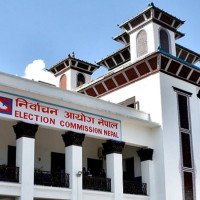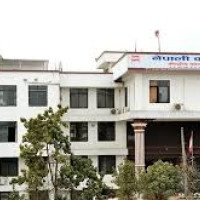- Thursday, 8 January 2026
Traders express reservations over provisions in new Customs Bill
Kathmandu, Aug. 5: Traders and exporters have expressed their reservations over the Customs Bill, 2080 while demanding amendments in some administrative and fee-related measures proposed by it.
As a new development in this row, Nepal Foreign Trade Association (NFTA), submitted a 22-point disagreement to Santosh Chalise, Chairperson of the Finance Committee of the House of Representatives (HoR) on Sunday morning.
A couple of days ago, some traders including the officials of the Nepal Chamber of Commerce (NCC), had voiced their concerns about the provisions proposed by the bill and demanded change in them. The NFTA and traders stated that the new bill was formulated without enough discussions and interactions with the private sector stakeholders.
Private sector representatives have also updated Deputy Prime Minister and Finance Minister, Bishnu Paudel, finance secretary and director general of the Department of Customs (DoC) about their concerns.
The bill that will replace the current Customs Act, 2064, is already tabled at the HoR.
The NFTA objected to the provision that if the price declared by the importers was nominally lower than the price determined by the customs officer, it would be considered under-invoicing.
It demanded to remove the provision that enabled the customs officer to classify the imported goods under the sub-headings he deemed appropriate and take a deposit for the amount of the customs duties.
The NFTA has objected to the provision of 25 per cent customs duty levied on the imported goods in cases where the name, nature, physical characteristics, properties, measurements, size and quality and quantity of the goods are declared appropriately but the country of origin is different from the one declared earlier.
"It is not fair to make the importers pay a fine of 50 per cent of the fee in the event that a general detail of the goods is left to be declared during the declaration. Only 2 per cent fine should be imposed on this," read a statement issued by the Association on Sunday.
It also expressed disagreement to the provision of asking 50 per cent additional deposits on the charges required to pass the goods if the customs officers had to go to a location out of the customs yard. The fee should be according to the customs price of the imported goods, said the NFTA.
The traders asked to include a provision to form a committee that would also have private sector representative to decide the issue if the importers disagreed on the decision of the customs officers. According to the provision in the bill, such decision would be made by the director general of the DoC.
The NFTA suggested amending the article in the bill that demands the importers should pay 100 per cent fine to the customs fee if there is an under-invoicing of up to 15 per cent. "It is against the spirit of trade facilitation," the Association concluded.
According to it, if it is found that there is a difference in the classification of the goods after inspection, it is reasonable to collect the fee to the extent of the difference, but the provision of 100 per cent penalty is not justified in the law.
However, the DoC rejected the claims of the traders that there were not enough interactions and discussions with them.
"This is not a new bill but the one that was already submitted to the Parliament four years ago. There were consultations with the private sector associations and bodies on the bill," said Punya Bikram Khadka, Director of the DoC.
According to him, the DoC had conducted adequate discussions about the fees and fines to be levied on the importers.
Likewise, the structure that would include the private sector representative in the review of the customs activities has been cancelled.
Likewise, the DoC also said that since there were many private sector organisations that have interest in trade and imports, some of them might have been left out in the discussion but all major private sector bodies had been consulted for the same.
"This is an effort to make the international trade more transparent and credible by including the provisions of the World Trade Organisation," said Khadka.













-original-thumb.jpg)



